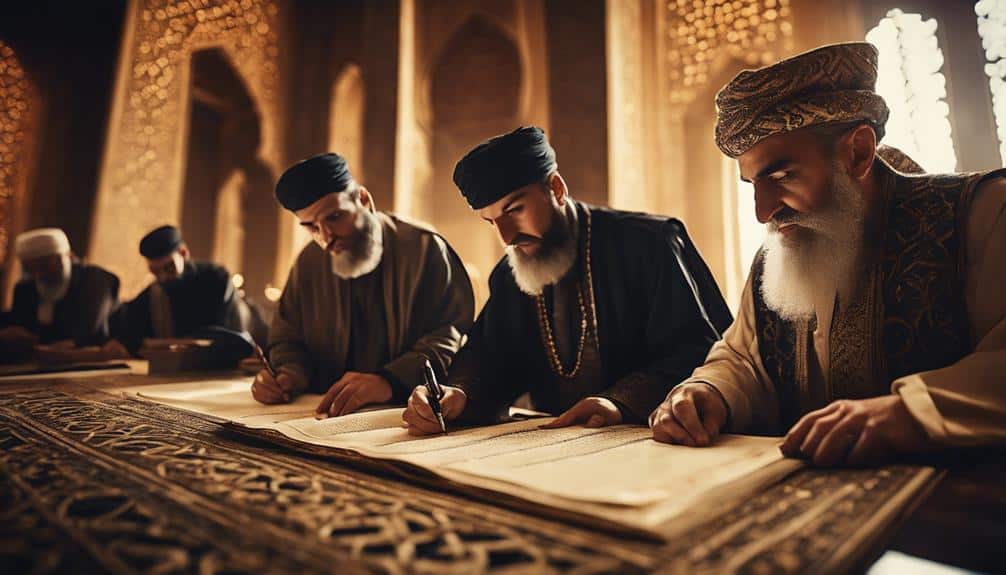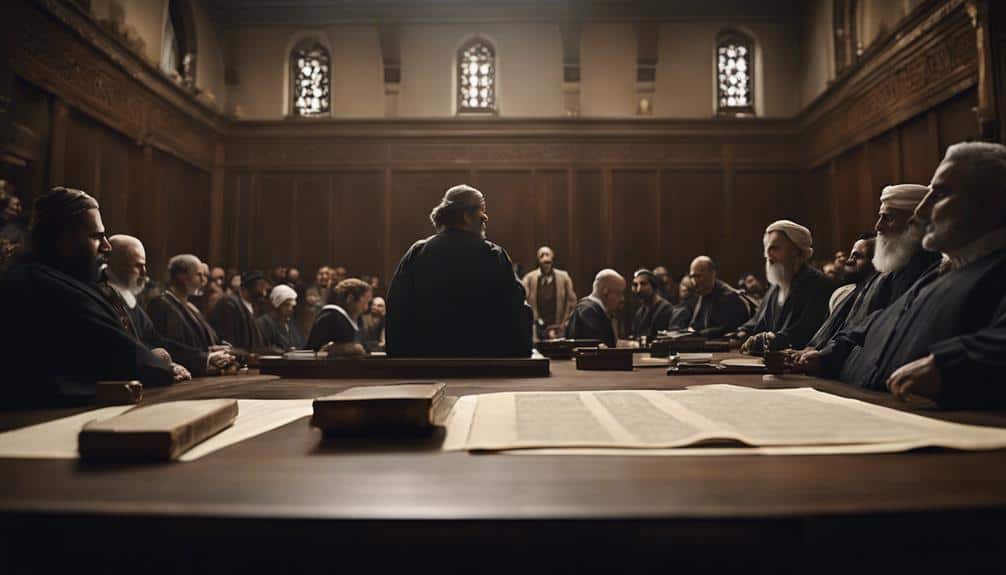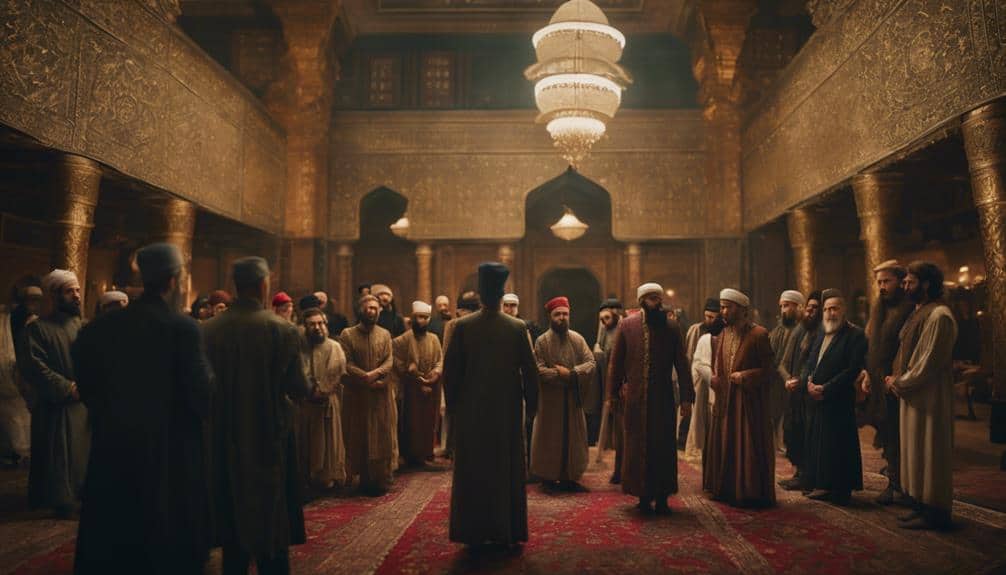Discover the intricacies of the Ottoman Empire's dual legal system. This system saw Sharia law and Kanun codes harmoniously coexist. Unveil how this blend of Islamic principles and secular regulations ensured justice and adaptability. It shaped a balanced judicial framework.
The Dual Legal System
The Ottoman Empire's legal framework was characterized by a dual system, integrating both Sharia law and the sultan's secular Kanun. This dual legal system allowed the empire to address a wide range of societal needs.
Sharia law, rooted in Islamic principles, was administered by religious authorities such as kadis and muftis. These laws governed personal conduct, family matters, and religious obligations, ensuring that the spiritual and moral guidelines of Islam were upheld.
On the other hand, Kanun was a secular legal code enacted by the sultan to regulate areas not explicitly covered by Sharia. This included administrative, criminal, and land laws, addressing the practical and temporal needs of the empire. By complementing Sharia, Kanun provided a necessary balance, allowing for flexibility and adaptation to changing circumstances.
The interaction between Sharia law and Kanun was essential for the functioning and stability of the Ottoman legal system. This dual approach ensured that both religious and secular aspects of governance were addressed, creating a thorough legal framework.
It allowed for an effective administration that could cater to the diverse and evolving needs of Ottoman society, maintaining order and justice across the empire.
Sharia Courts and Kanun

You'll find that Sharia courts in the Ottoman Empire primarily handled matters rooted in Islamic law, particularly the Hanafi school of jurisprudence.
Meanwhile, Kanun laws filled gaps by addressing areas like taxation, commerce, and criminal issues that Sharia didn't cover.
This interplay between Sharia and Kanun created a harmonized legal framework that integrated religious and secular governance.
Sharia's Jurisdictional Scope
Understanding Sharia's jurisdictional scope in the Ottoman Empire requires examining how Sharia courts addressed personal status issues while Kanun handled secular matters like criminal law and taxation.
Sharia courts, operating under Islamic law, focused on personal status cases involving marriage, divorce, and inheritance. These courts were presided over by kadis, judges who interpreted and applied Islamic principles to resolve disputes.
The Sharia courts' jurisdiction over personal status matters ensured that religious laws governed essential aspects of daily life, reflecting the Ottoman commitment to Islamic tradition.
In contrast, Kanun, the secular legal system, addressed areas outside the religious domain. It covered criminal law, taxation, and land tenure, creating a thorough legal framework when combined with Sharia.
This division of responsibilities between Sharia courts and Kanun allowed the Ottoman Empire to blend religious and administrative needs effectively. Secular judges enforced Kanun, ensuring that the legal system remained balanced.
The interaction between these two systems showcased the Empire's intricate approach to governance, allowing for both religious adherence and administrative efficiency. By understanding this interplay, you gain insight into how the Ottomans maintained order and justice throughout their vast and diverse empire.
Kanun's Supplementary Role
When examining Kanun's supplementary role, you'll find it necessary in filling gaps left by Sharia law, particularly in criminal justice, taxation, and land regulation. Sharia law, while extensive in many respects, doesn't cover every aspect of governance. This is where Kanun steps in, providing a detailed legal framework to address those unresolved matters, ensuring a more standardized legal practice across the empire.
In criminal justice, Kanun offered specific punishments and regulations not explicitly detailed in Sharia law, ensuring consistent enforcement. For taxation, it established clear guidelines and rates, important for the empire's economic stability. Concerning land regulation, Kanun laid out rules for land ownership and usage, which were crucial for managing the vast and diverse territories of the Ottoman Empire.
The interaction between Sharia courts and Kanun created a balanced governance structure that catered to both religious and secular needs. Kanun's role wasn't to override Sharia but to complement it, providing a holistic legal system. This coexistence exemplified the intricate balance the Ottomans achieved between religious and secular laws, ensuring effective governance throughout the empire.
Harmonizing Legal Frameworks
Balancing the intricate relationship between Sharia courts and Kanun, the Ottoman legal system managed to create a cohesive framework that effectively governed the empire.
Sharia courts, rooted in Islamic law, provided moral and religious guidance, while Kanun, a body of secular legislation, addressed pragmatic needs such as crime punishments, taxation, and land regulations. This dual legal structure wasn't merely a coexistence but a harmonization of legal frameworks to ensure thorough governance.
Ottoman sultans wielded the authority to enact Kanun, guaranteeing it complemented, rather than conflicted with, Sharia principles. This authority allowed sultans to address gaps in Sharia, thereby enhancing the legal system's functionality. By integrating these two legal frameworks, the empire accommodated the diverse religious and cultural backgrounds of its citizens, promoting social harmony.
The interaction between Sharia courts and Kanun was essential for the effective administration of justice. While Sharia dealt with personal and religious matters, Kanun provided a structured approach to broader administrative issues. This balance allowed the Ottoman Empire to maintain order and stability, illustrating a sophisticated legal system adept at managing complexity and diversity within its vast territories.
Role of the Qadi

Qadis in the Ottoman Empire were essential in interpreting and enforcing Sharia law, guaranteeing justice through their autonomous judicial authority. Appointed as judges, qadis presided over Islamic courts where their primary role was to interpret and apply religious laws. They were vital in resolving disputes, issuing legal rulings, and maintaining order within their jurisdictions. The independence of qadis from political influence was a cornerstone of their function, allowing them to administer justice impartially and ensuring fairness for everyone involved.
In their capacity, qadis dealt with a wide range of cases, including family disputes, criminal matters, and commercial conflicts. They ensured that both Muslims and non-Muslims received fair trials, highlighting their significance in the multi-ethnic Ottoman society. The qadis' decisions were based on a thorough understanding of Sharia law, which they applied meticulously to each case, balancing the letter of the law with practical considerations.
Their role wasn't only judicial but also social, as they were respected community leaders. By upholding the legal system and guaranteeing fair trials, qadis played a vital role in the stability and integrity of the Ottoman Empire's legal framework.
Kanun's Codification

When you consider Kanun's codification in the late 15th century, you're looking at a pivotal moment for the centralization of legal authority in the Ottoman Empire.
This codification didn't just supplement Sharia law; it established a clear hierarchical social structure and standardized governance.
Centralization of Legal Authority
In the late 15th century, the codification of Kanun marked a pivotal shift towards centralizing legal authority under the sultan, thereby redefining the governance and societal structure of the Ottoman Empire. This centralization was essential as it granted the sultan more direct control over legal matters, effectively consolidating power and guaranteeing uniformity across the vast empire.
Kanun laws encompassed a wide array of domains, including taxation, administration, and social order. By codifying these regulations, the sultan could standardize governance practices, mitigating regional discrepancies and fostering a cohesive legal framework. This process not only amplified the sultan's authority but also streamlined the administrative machinery of the Ottoman Empire.
Key aspects of Kanun's codification included:
- Taxation: Establishing consistent tax codes to secure equitable revenue collection.
- Administration: Standardizing administrative procedures to enhance efficiency across the empire.
- Social Order: Implementing laws to maintain public order and societal norms.
- Judicial Oversight: Centralizing judicial decisions to reinforce the sultan's role as the ultimate legal authority.
- Governance Structure: Redefining the societal hierarchy into a structured, two-tier system.
Supplementing Sharia Law
Kanun's codification in the late 15th century meticulously supplemented Sharia law by addressing secular matters like taxation, administration, and crimes outside the purview of religious doctrine. This codification was vital in centralizing decision-making and consolidating the sultan's authority within the Ottoman legal system. By delineating regulations for issues not explicitly covered by Sharia law, Kanun provided a structured framework for governance that could adapt to the Empire's evolving needs.
In the Ottoman legal system, Sharia law focused primarily on religious and moral guidance, leaving gaps in areas important for state administration. Kanun filled these gaps by establishing clear rules for taxation, ensuring a steady revenue stream for the state. It also laid down detailed administrative procedures, thereby enhancing bureaucratic efficiency and consistency across the Empire.
Moreover, Kanun addressed secular crimes, prescribing penalties for offenses that fell outside the scope of religious jurisprudence. This dual legal system of Sharia and Kanun enabled the Ottoman Empire to govern its diverse population more effectively. By supplementing religious law with secular regulations, Kanun's codification secured the smooth functioning of the legal and administrative machinery, reinforcing the sultan's centralized control.
Hierarchical Social Structure
The codification of the Kanun in the late 15th century restructured Ottoman society into a clear two-tiered hierarchy, impacting property rights, inheritance laws, and social obligations. This hierarchical social structure divided society into the ruling class (askeri) and the subjects (reaya). The Kanun laws were meticulous in defining the roles and responsibilities of each class, ensuring that social order was maintained and that the sultan's authority remained unchallenged.
Kanun laws were detailed, addressing various societal aspects:
- Property Rights: The Kanun established regulations on land tenure, ensuring that land ownership and usage were clearly defined.
- Inheritance Laws: These laws standardized inheritance practices, making succession processes predictable and orderly.
- Taxation: The Kanun codified tax obligations, delineating how much each class was required to contribute.
- Social Obligations: These laws outlined the duties of the ruling class towards the subjects and vice versa, reinforcing social cohesion.
- Centralization of Power: The codification helped consolidate the sultan's control over legal and administrative matters.
Legal Reforms of 1839

Legal reforms initiated by the Edict of Gülhane in 1839 aimed to modernize the Ottoman judicial system by ensuring fair trials and incorporating non-Muslim testimonies. These changes were a pivotal step toward legal modernization in the Ottoman Empire, reflecting an aspiration to align more closely with Western judicial practices.
One essential aspect of these legal reforms was the separation of competences, which helped streamline and clarify judicial responsibilities. This reorganization facilitated more efficient and just judicial processes.
Another significant change was the validation of non-Muslim testimonies, a move towards greater inclusivity and fairness within the legal framework. This marked a significant departure from previous practices, where testimonies from non-Muslims were often disregarded.
Additionally, the period saw the introduction of specific land codes, civil codes, and a code of civil procedure. These legal instruments provided a structured and systematic approach to land ownership, civil rights, and judicial processes.
Reforms in inheritance, marriage, and child custody also reflected European influence, showcasing the empire's commitment to progressive transformation. By incorporating these changes, the Ottoman Empire aimed to create a more equitable legal system, capable of addressing the diverse needs of its populace while embracing modernity.
Influence of the Ulema

You must understand how the Ulema's legal authority greatly shaped the Ottoman legal system. Their ability to interpret and apply Sharia law directly impacted legal reforms and the alignment of the Kanun with Islamic principles.
Ulema's Legal Authority
In the Ottoman Empire, the ulema's legal authority was pivotal in guaranteeing that all aspects of governance adhered to Islamic principles. The ulema exerted significant influence over legal decisions, acting as judges, interpreters of Islamic law, and advisors to the rulers. Their involvement guaranteed that legal matters aligned with Sharia law, maintaining a balance between religious and secular laws.
The ulema's legal authority was multifaceted:
- Judicial Roles: They served as judges (qadis) in courts, ensuring justice was dispensed in accordance with Islamic law.
- Interpreters of Law: The ulema interpreted and clarified complex legal texts, providing guidance on Sharia.
- Advisory Capacity: They advised sultans and other officials, significantly shaping policy and governance.
- Validation of Laws: Secular laws (kanun) were subject to the ulema's scrutiny to ensure they didn't conflict with religious principles.
- Educational Impact: They oversaw religious education, which in turn influenced the legal and moral fabric of society.
Through these roles, the ulema not only shaped the legal landscape but also reinforced the integration of Islamic principles into the governance of the Ottoman Empire. Their authority was essential in maintaining the empire's legal and moral integrity.
Impact on Legal Reforms
The ulema's noteworthy influence over legal decisions didn't just guarantee adherence to Sharia law but also profoundly shaped legal reforms within the Ottoman Empire. As Islamic scholars, the ulema were pivotal in interpreting and applying Sharia law, ensuring that all legal changes aligned with Islamic principles. Their advisory role to rulers on legal matters underscores the intricate balance between religious and secular governance.
When the Ottoman rulers introduced Kanun laws, which were secular regulations addressing administrative and criminal matters, the ulema ensured these laws didn't conflict with Sharia law. This fusion of religious and state laws was essential in maintaining the empire's social and legal cohesion. By advising on and legitimizing Kanun laws, the ulema facilitated a legal system that was both flexible and consistent with Islamic teachings.
Moreover, the ulema's involvement in legal reforms wasn't merely superficial. Their deep-rooted authority in legal affairs meant they could influence significant changes, ensuring that reforms were both practical and theologically sound. This blend of religious oversight and legal innovation allowed the Ottoman legal system to evolve while maintaining a strong foundation in Islamic jurisprudence, highlighting the important role of the ulema in shaping the empire's legal landscape.
Biases and Fairness

Although the Ottoman legal system institutionalized biases against non-Muslims, it managed to maintain a degree of fairness in interfaith disputes. The Islamic courts primarily handled legal matters, including trade conflicts and interfaith issues. Despite inherent biases, the system aimed for a balanced approach in resolving these disputes, showcasing a commitment to fairness.
To understand the complexity, consider the following key points:
- Biases against non-Muslims: Non-Muslims often faced discriminatory practices in legal proceedings.
- Fairness in interfaith disputes: The system aimed to provide equitable resolutions in conflicts involving different faiths.
- Role of Kanun: The codified administrative law supplemented religious laws, particularly in taxation and administration, ensuring a structured legal framework.
- Criminal law codes: Three distinct criminal law codes were followed in the 19th century, reflecting the legal system's evolution.
- Judicial structure: Islamic courts were central, but the system also included mechanisms to address interfaith and commercial disputes.
Interfaith Dispute Resolution

Many aspects of the Ottoman legal system's interfaith dispute resolution highlight its commitment to fairness and justice across religious boundaries. The Ottomans established separate courts specifically to handle interfaith disputes, ensuring that both Muslims and non-Muslims could seek equitable resolutions. By utilizing Islamic courts for these cases, the Ottoman legal system demonstrated its dedication to resolving conflicts within the framework of Sharia law while still protecting the rights of all individuals.
In instances of interfaith disputes, non-Muslims weren't excluded from the justice system. They had the ability to bring their grievances to Ottoman courts, which aimed to adjudicate these conflicts with relative fairness. This approach fostered a sense of justice and equality among the diverse religious communities within the empire.
The balance between Islamic law and secular governance in the Ottoman legal system was essential in handling interfaith disputes. It emphasized harmony and justice between different religious groups, ensuring that the legal framework was inclusive and considerate of the empire's diverse population. This intricate system highlighted the Ottomans' endeavor to maintain social cohesion and protect the rights of all its subjects, regardless of their faith.
Taxation and Administration

Shifting focus from interfaith dispute resolution, one must analyze how the Ottoman legal system's taxation and administration, governed by Kanun, structured the empire's economic foundation. The Kanun provided meticulous regulations on land taxes, trade tariffs, and administrative fees, guaranteeing a systematic approach to revenue generation. By outlining responsibilities for tax collectors, it allowed for consistent assessment of land values and equitable distribution of tax burdens.
Kanun's administrative laws guaranteed that tax collectors adhered to a standardized process, facilitating efficient tax collection and reducing corruption. Tax revenues were essential for funding military campaigns, infrastructure projects, and governmental operations, creating a robust financial backbone for the empire.
Key aspects of the Ottoman taxation and administration under Kanun include:
- Land Taxes: Assessed based on land value, ensuring fairness and consistency.
- Trade Tariffs: Imposed on goods to regulate commerce and boost imperial revenues.
- Administrative Fees: Collected for various governmental services, contributing to overall revenue.
- Tax Collector Duties: Strictly defined to maintain order and prevent misuse of power.
- Revenue Distribution: Guaranteed funds supported essential state functions and public works.
Understanding these elements provides insight into how the Kanun maintained social order and economic stability within the Ottoman Empire, demonstrating the legal system's role in fostering a prosperous state.
Legacy and Influence

The Ottoman legal system's legacy and influence are evident in the modern legal frameworks of countries that were once part of its vast empire, reflecting its enduring impact on contemporary governance and judicial practices. You can observe this influence in the legal systems of nations across the Middle East, North Africa, and Southeast Europe.
The extensive Kanun, which addressed various aspects of daily life and governance, has left a significant imprint on these regions. By integrating Islamic law with administrative regulations, the Ottomans created a hybrid legal structure that continues to shape judicial and administrative practices today.
Many modern states in these regions still reflect elements of Ottoman legal principles, especially in the areas of family law, property rights, and administrative procedures. The Ottoman system's emphasis on a codified set of laws provided a foundation for orderly governance, which has been adapted and modified by successor states to suit contemporary needs.
This enduring legacy underscores the Ottoman Empire's sophisticated approach to legal governance, demonstrating its far-reaching influence beyond its historical borders. As you explore further, you'll appreciate how the Ottoman legal systems have shaped and continue to influence modern legal practices.


